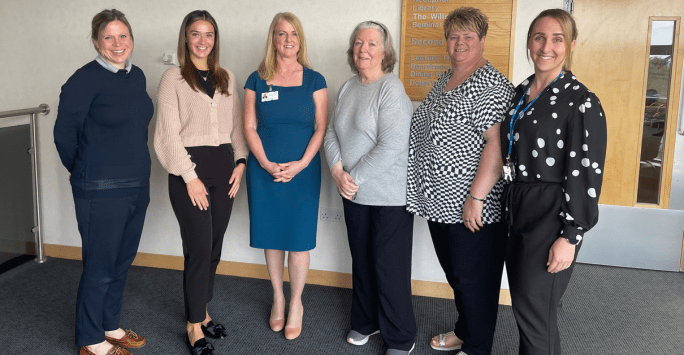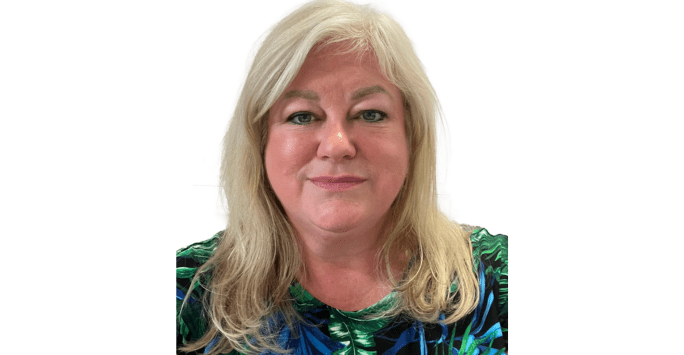
Studying medicine at Liverpool opens up a broad selection of exciting clinical learning opportunities at trusts across the city region.
Wirral University Teaching Hospital NHS Foundation Trust provides healthcare for people of the Wirral Peninsula and surrounding area. Its two main sites, Arrowe Park Hospital and Clatterbridge Hospital, welcome Liverpool student doctors for clinical placements from Years Two to Five of the MBChB programme.
We caught up with Rachael Mitchell, Lead for Medical Education and Workforce Transformation at Wirral University Teaching Hospital (WUTH), to learn more about the trust’s partnership with the School.
What types of placements does the team manage for Liverpool student doctors?
WUTH supports around 560 student placements each year at Arrowe Park and Clatterbridge, ranging from Year 2 students on their first ever clinical placement, through Years 3 and 4, to Year 5 students who are preparing to qualify.
Year 2 students attend four times a year for a varied one-week placement covering a mixture of specialties. In Year 3, there are seven rotations of four-week blocks, where students spend time in Medicine, Surgery, Obstetrics and Gynaecology or Paediatrics.
Year 4 Students come to WUTH in eight rotations of four-week blocks across the Department of Medicine for the Elderly, Rheumatology and Renal Departments, as well as eight rotations of students spending one week each in Ophthalmology. Moving on to Year 5, students rotate through Emergency Medicine, Acute Medicine, Acute Surgery, and Critical Care and Anaesthetics over the course of a 20-week acute block, plus a further six-week Preparation for Practice rotation to complete their training.
What does this size of operation require?
There are a number of teams involved in supporting our medical students.
Every person in the Trust can contribute positively to the learning and experience of our medical students.
Our Undergraduate Team is dedicated to looking after the administration of our student intake and is made up of four experienced administrators, Adele, Jay, Ev and Christine, and a Deputy Medical Education Manager, Lisa Hill, with extensive undergraduate knowledge.
The Undergraduate Team reports to the Lead for Medical Education and the team has two Sub-Deans, four Year Leads, a Simulation Lead and Specialty Lead for each specialty.
The senior team includes myself as Lead for Medical Education and Workforce Transformation, Director of Medical Education Professor James Barrett, Deputy Director of Medical Education Dr Richard Latten, who has a specific focus on health and wellbeing, Deputy Medical Director Mr Mike Ellard and the Executive Lead for Medical Education Dr Nikki Stevenson, Medical Director/Deputy CEO.
Together with the specialty leads, we work collaboratively with the admin team to provide the clinical information needed to create the timetables and meet the requirements of the students.
We have a supportive and structured wider senior medical education team who meet weekly.
The experience of our medical students is a high priority for all of us and support comes from the very top of the organisation starting with the Executive Medical Director.
Whilst the majority of teaching is consultant led, there are many medical and non-medical, clinical and non-clinical roles within the Trust that contribute directly and indirectly to the development and nurturing of our medical students. These include Pharmacy, Allied Health Professionals and Advanced Nurse / Clinical Practitioners.
We are proud to work with over 75 enthusiastic and supportive clinicians who take on the roles of educational supervisor, CBL tutor and bedside tutor.
Our Clinical Skills Team and Simulation Team support the delivery of the undergraduate programme, and we also have full-time Pharmacy support in place.

WUTH Lead for Medical Education and Workforce Transformation Rachael Mitchell
How do you collect and build on student feedback?
We welcome and encourage all informal and formal student feedback. The Deputy Manager and administration team are always on-site and accessible to students, and the team meets with students at the beginning, mid-point and at the end of each placement.
Student evaluation reports are circulated to the team on receipt from the School and discussed formally at the next weekly team meeting. The information is shared with the Medical Education Team and any other appropriate staff, e.g. speciality leads, and all actions are recorded and monitored in an action plan. Items of particular importance (both positive and constructive) are shared with the Medical Director, Deputy Medical Director, Director of Medical Education and Deputy Director for Medical Education.
Over summer, the previous year’s student placement evaluation reports are reviewed by the admin team, speciality leads and year leads in face to face meetings and the feedback is used to support the development of the following academic year’s timetables.
This feedback is also discussed during the annual Education Supervisor refresher course held by the Sub-Deans and Year Leads.
During each rotation the admin team hold midpoint feedback sessions to ensure students are on track to meet their portfolio requirements and that any concerns are addressed in a timely and appropriate manner.
What stand-out changes or implementations have been made thanks to student input?
The team are continuously looking at how the programme can be enhanced to provide meaningful placements that equip our future workforce with the appropriate skills and experience.
Students have given us continual feedback about the value and importance of having immediate access to our team (administration and management).
We deal with issues and queries immediately and have a process in place to escalate things further if needed.
On the back of feedback that students were having difficulty organising meetings with their education supervisor when they were already out on placement, for the past two academic years the admin team have scheduled each student’s first meeting to ensure they take place in a timely manner, which has been very well organised and well received.
We have added simulation to the timetable for Year 2 students. We have also introduced Year 2 students swapping their ward allocations halfway through their rotation, making the opportunities available varied, fairer, and more equitable. Both of these changes have received really positive feedback.
Most of the team are trained in mental health first aid, which enables us to provide the right support to students when they need it.
Recently, conversations have taken place regarding topics such as facilitating discussion on gender issues and gender matters and ethical aspects such as the right to touch and be touched.
What aspect of your work do you find most rewarding?
We get so many rewards from supporting students! We are passionate about contributing to our future workforce and excellent patient care through effective and meaningful experiences and learning. It is lovely to be recognised by the University of Liverpool for the excellent work we do.
Sadly, we have had a couple of students who have had a significant personal upset during their training with us, and the admin team have been on hand to provide support during such a distressing time for them. The students have sent us some personal, very heartfelt cards which has been really touching. We were really glad that the students were still able to achieve great things whilst going through such a difficult time in their lives.
Receiving recognition from the students through personal thank you cards and through mentions in student placement evaluation reports is really special.
As is watching the students progress through each year and then graduate, and of course seeing them come back to work for the Trust as Foundation Year 1 Doctors!
What advice would you give to a student who is preparing for their first clinical placement?
- Be confident and aware of your own abilities.
- Always introduce yourself.
- Don’t be afraid of not knowing the answer.
- Keep on top of your portfolio work.
- Speak up and feedback.
- If you need support, reach out, that’s what we’re here for.
A few words from Dr Nikki Stevenson, WUTH Executive Medical Director & Deputy CEO -
“As Medical Director at Wirral University Teaching Hospital, I want to say how much we value the contribution of our medical students and the relationship we have with The University of Liverpool. We aim to offer the highest quality experience to help undergraduates to learn and grow in their medical careers.
The combination of a live acute hospital environment, interacting with patients and learning from experienced clinical colleagues, alongside classroom learning in our purpose-built medical education centre, provides a great all-round grounding for a future clinical career.
We also offer clinical simulation training using the latest technology and pastoral support for undergraduate colleagues. We are really proud of our investment in the doctors of the future.”
Discover more
- Follow Wirral University Teaching Hospital on Twitter (link) to learn more about how the trust’s contributions to Liverpool student doctors and the local community.
- Dive into the breadth of specialist clinical learning opportunities available at Liverpool School of Medicine on the Why Liverpool? webpage (link).
- Liverpool student doctors can learn more about how their feedback is utilised to continuously optimise the MBChB curriculum and overall student experience on the Student Representation and Feedback section of the student intranet (link).